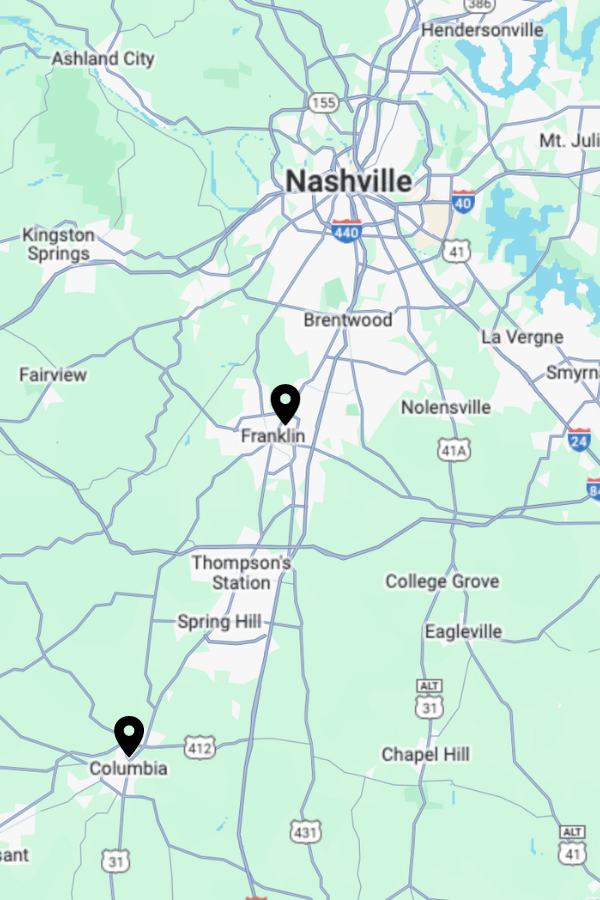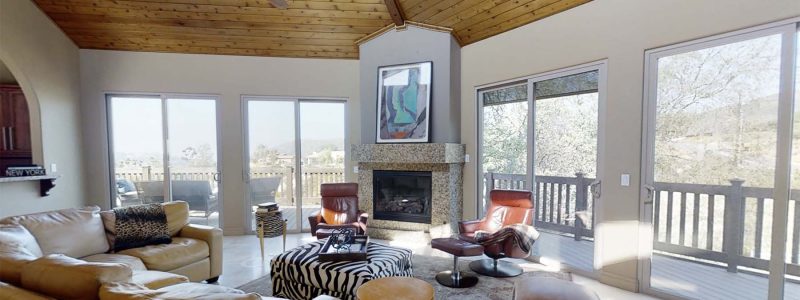Apex Addiction Recovery Center has multiple rehab facilities in Tennessee, offering comprehensive addiction treatment services. With a focus on holistic healing and personalized care, our facilities provide a supportive environment for people seeking recovery. From detoxification to therapy, we are committed to helping our clients achieve lasting sobriety and wellness.
Apex Drug and Alcohol Addiction Recovery Center specializes in rehab treatment for substance abuse and dual diagnosis, addressing concurrent mental health and addiction issues. Our approach combines medical, psychological, and holistic methods to ensure comprehensive care. Our custom-made programs foster recovery, resilience, and a return to wellness for those grappling with these complex challenges.

What is Dual Diagnosis Treatment for Addiction Rehab and Mental Health?
Dual Diagnosis treatment in the context of addiction rehab and mental health is a specialized approach that simultaneously addresses substance abuse and mental health disorders. Recognizing that addiction and psychiatric conditions often co-exist, this treatment integrates strategies to manage both issues comprehensively.
Patients receive a combination of therapies, including medication management, individual and group counseling, and behavioral therapies, tailored to their distinct needs. By focusing on both aspects, Dual Diagnosis support improves outcomes, reduces relapse rates, and supports long-term recovery, enabling people to achieve better mental health and live substance-free lives.
Free Addiction Assessment
Schedule a free, confidential assessment with a licensed clinician. Apex Recovery can check your insurance coverage levels for drug and alcohol addiction, and mental health treatment.
What is Co-Occurring Disorders for Addiction and Mental Health Treatment?
Co-occurring disorders are the simultaneous presence of an addiction and a mental health disorder in a person. This complex condition needs an integrated approach to treatment, as both the substance abuse and the mental health issue influence each other and must be addressed together to ensure effective recovery.
Treatment for co-occurring disorders typically involves a combination of therapies, including medication management, counseling, and support groups, tailored to treat comorbid conditions simultaneously. This holistic recovery approach helps improve overall well-being, reduce symptoms of both disorders, and enhance the person’s ability to function.
Are you or a loved one looking for Co-Occurring Disorder treatment near me? Reach out to Apex today at (877) 881-2689. One of our compassionate staff members will help find the best Co-Occurring treatment options nearby.
What is Co-Occurring Disorders Inpatient Treatment?
Co-occurring disorders inpatient treatment centers offer a specialized form of care where patients receive intensive, round-the-clock support within a residential setting. In this structured environment, people have access to a comprehensive range of services, including medical supervision, psychiatric evaluation, dual diagnosis therapy sessions, and medication management.
The co-occurring disorders residential treatment center setting provides a safe and controlled space for patients to focus solely on their recovery from both addiction and mental health issues. Additionally, it offers constant monitoring by trained professionals, promoting a supportive atmosphere conducive to healing. This level of care ensures that patients receive immediate assistance and ongoing support throughout their journey towards sobriety and mental wellness.
What is Co-Occurring Disorders IOP Treatment?
Co-occurring disorders Intensive Outpatient Program (IOP) treatment is a structured therapeutic option designed for people managing both addiction and mental health disorders, without the need for 24/7 supervision. IOP allows patients to live at home or in a sober living environment while attending frequent therapy sessions and support groups.
Typically, these programs require participation several days a week for multiple hours each day, offering a balance between intensive care and personal independence. This format includes evidence-based therapies, psychiatric care, and peer support, focusing on relapse prevention, coping strategies, and mental health rehabilitation. IOP serves as a critical step for those transitioning from inpatient care or as a direct approach for those needing substantial support without full hospitalization. Reaching out is the first step towards living a sober life. Call us today at (877) 881-2689, one of our team members will help find the best Co-Occurring Disorder IOP treatment facility nearby.
What is Co-Occurring Disorders PHP Treatment?
Co-occurring disorders Partial Hospitalization Program (PHP) treatment is a structured and intensive form of care offering support for those dealing with addiction and mental health issues. PHP provides a step-down level of care from inpatient treatment, offering therapy, medication management, and other services during the day while patients can return home or to a sober living environment in the evenings.
This program typically runs several days a week for several hours each day, providing a supportive and therapeutic environment to address both disorders simultaneously. PHP serves as a crucial bridge between inpatient care and outpatient integrated treatment, offering a higher level of support than traditional outpatient programs.
National Statistics on Co-occurring and Multiple Disorders
In 2022, 21.5 million Americans aged 18 or older had co-occurring disorders, constituting 8.4% of adults in the U.S. Additionally, 23.1% of adults experienced any mental illness, with 15.4 million having a serious mental illness. 48.7 million adults had a Substance Use Disorder (SUD), with 1 in 10 having an Alcohol Use Disorder.
Worryingly, 37.9% of those with SUD also had a mental illness, and 18.2% of those with mental illness had a SUD. Despite these figures, only 10% of adults with co-occurring disorders received treatment for both conditions, while 42% received no treatment at all. This lack of intervention is reflected in the high arrest rate, with adults with co-occurring disorders accounting for 15% of all arrests in the past year.
Apex Recovery cares about you and your loved ones health. Whether you are searching for a therapist for bipolar disorder or free anger management classes near me in Tennessee, we are here to help. Call us today at (877) 881-2689, one of our team members will help find the best treatment option nearby.

- Please complete and send the form below.
- One of our staff members will contact your insurer to check your coverage.
- We will contact you promptly with the results and to discuss the next steps.
Insurance Verification
"*" indicates required fields
Finding Co-Occurring Treatment Centers Near Me
How do I find co-occurring disorders treatment centers near me? Explore our programs in Middle Tennessee. Call Apex Recovery at (877) 881-2689 to learn about our comprehensive services, tailored to address addiction and mental health needs simultaneously. Take the first step towards nearby recovery with our supportive and personalized approach.
Free Addiction Assessment
Schedule a free, confidential assessment with a licensed clinician. Apex Recovery can check your insurance coverage levels for drug and alcohol addiction, and mental health treatment.

Co-Occurring Treatment Programs in Middle Tennessee (TN)
We proudly operate two co-occurring treatment programs at Apex Addiction Recovery Center in Tennessee. The Tennessee locations provide accessible, comprehensive care for people facing addiction and mental health challenges, offering a path to recovery and wellness.
Apex Recovery Franklin
4601 Carothers Pkwy STE 250A
Franklin, TN 37067
Apex Recovery Columbia
2710 Trotwood Ave STE A & B
Columbia, TN 38401

What is Treated at a Co-Occurring Disorder Residential Treatment Center?
A co-occurring disorder residential treatment Center offers comprehensive care addressing various aspects of addiction and mental health. Our programs include rehab for Substance Use Disorders (SUDs), recovery for Mental Health Disorders, treatment for Co-occurring Disorders/Dual Diagnosis, and rehabilitation for Behavioral Addictions. Each program promotes holistic healing and lasting recovery.
Rehab Programs for Substance Use Disorders (SUDs)
Rehab programs for Substance Use Disorders (SUDs) are essential in addressing the complex challenges of addiction across a spectrum of substances, each with its unique impact on the mind and body. For Alcohol Use Disorder, treatments often begin with detoxification, followed by therapy to address underlying triggers.
Opioid Use Disorder treatments may include medication-assisted therapies like buprenorphine, alongside counseling, to reduce cravings and ease withdrawal symptoms. Cocaine and Methamphetamine Use Disorders are tackled through intensive behavioral therapies, helping to break the cycle of addiction by altering thought patterns and behaviors. Cannabis Use Disorder treatment focuses on cognitive-behavioral strategies to manage dependence and build healthy coping mechanisms.
Prescription Drug Abuse, including a range of medications from opioids to stimulants, requires a tailored approach that often combines detox, medication management, and behavioral therapy.
These programs at local co-occurring disorders rehabilitation centers prioritize personalized care to address the physical, psychological, and social facets of addiction, guiding people towards a path of recovery and healing.
Recovery Programs for Mental Health Disorders
Recovery programs for mental health disorders offer specialized treatments to support people dealing with a range of psychiatric conditions. For depression, interventions may include a combination of medication and psychotherapy, alleviating symptoms and improving mood. Anxiety disorders, such as generalized anxiety disorder and panic disorder, are treated through therapies that help people manage anxiety levels and develop coping strategies.
Bipolar disorder requires a nuanced approach, often involving mood stabilizers and psychoeducation to balance mood swings. Schizophrenia treatment integrates antipsychotic medications with social skills training to enhance daily functioning. Post-traumatic stress disorder (PTSD) programs prioritize trauma-focused therapy to help people process and overcome traumatic experiences.
Obsessive-compulsive disorder (OCD) is treated with different forms of cognitive-behavioral therapy that reduce compulsive behaviors. Lastly, Borderline Personality Disorder treatments may involve Dialectical Behavior Therapy (DBT), which teaches emotional regulation and interpersonal effectiveness.
These recovery programs are designed to address the specific symptoms and challenges of each disorder, promoting mental wellness and improved quality of life.
Looking for a bipolar retreat program, ptsd treatment, or depression treatment near me, reach out to us today at (877) 881-2689. Apex recovery is here to help as you begin your mental health journey.
Co-occurring Disorders / Dual Diagnosis Treatment Programs Near Me
Co-occurring disorders or Dual Diagnosis treatment programs are essential for people facing the dual challenge of mental health disorders and substance dependence. These programs provide an integrated care approach that addresses both aspects simultaneously, recognizing the complex relationship between mental health and substance abuse.
For instance, people struggling with depression and alcoholism receive treatment that tackles the depressive symptoms while also addressing alcohol dependence, ensuring a holistic approach to recovery. Anxiety and opioid dependence are treated with therapies that reduce anxiety levels and manage opioid withdrawal, alongside strategies to prevent relapse.
Bipolar Disorder and cocaine addiction require a coordinated treatment plan that stabilizes mood swings and addresses the stimulant addiction. PTSD and substance abuse treatments focus on trauma-informed care, helping people cope with traumatic memories without relying on substances.
Schizophrenia and coexisting substance use and mental health treatment programs offer psychiatric care alongside substance abuse interventions, to improve overall functioning and quality of life.
These programs underscore the importance of treating co-occurring disorders in tandem for effective recovery outcomes.
Rehabilitation Programs for Behavioral Addictions Near Me
Rehabilitation programs for behavioral addictions provide specialized support for people dealing with compulsive behaviors. Examples include gambling addiction treatment, addressing the cognitive and emotional components of excessive gambling through therapy and support groups. Internet or gaming addiction programs focus on managing screen time, developing healthier habits, and addressing underlying psychological triggers.
Sex addiction treatment offers therapy to explore underlying issues, establish boundaries, and foster healthy relationships. These programs emphasize behavioral modifications, coping strategies, and relapse prevention techniques, empowering people to regain control over their lives and break free from destructive behavioral patterns.
Does Health Insurance Cover Co-Occurring Disorders / Dual Diagnosis Treatment?
Health insurance coverage for co-occurring disorders/Dual Diagnosis treatment varies depending on the policy and provider. Many insurance plans offer coverage for these services, including detoxification, therapy, and medication management. However, the extent of coverage and specific treatments included can differ. It’s crucial for individuals to review their insurance policies carefully and verify coverage details.
At Apex Alcohol and Drug Addiction Recovery Center, we work with various insurance providers to help people navigate their coverage options for co-occurring disorders/Dual Diagnosis interventions. Contact us today online or call us at (877) 881-2689 to speak with our knowledgeable team and learn more about how we can assist you in accessing the care you need. We can also check your insurance quickly to get started at our co-occurring disorders addiction treatment centers. Please visit our Insurance page for all the details.
Which Health Insurance Providers Cover Dual Diagnosis / Co-Occurring Disorders Rehab?
Many health insurance providers recognize the importance of covering Dual Diagnosis/Co-Occurring Disorders rehab. Major insurance companies, including Blue Cross Blue Shield, UnitedHealthcare, Aetna, Cigna, and Humana, often provide some level of coverage for these services, although the specifics can vary widely based on the plan and location.
These companies typically cover a range of treatments, including inpatient and outpatient rehab, therapy, and medication management, under their mental health and substance abuse treatment provisions. Contact the experts at Apex Substance Addiction Recovery Center to understand the extent of your coverage and any potential out-of-pocket costs for rehab and local services, so you can see how your future recuperation is within reach.
How Much Does Co-Occurring Treatment Cost Without Health Insurance Coverage?
The cost of Co-Occurring Treatment without health insurance coverage can vary significantly depending on several factors, including the type of treatment program, duration, amenities, and geographic location. On average, residential treatment programs can range from $10,000 to $30,000 or more per month.
Intensive outpatient programs may cost between $3,000 to $10,000 per month. Outpatient services and therapy sessions typically range from $100 to $300 per session. Medication costs and additional services may also contribute to overall expenses. Without insurance, people may explore financing options or payment plans like those offered at Apex Alcohol and Drug Addiction Recovery Center.
What are Long-Term Co-Occurring Treatment Programs
Long-term co-occurring treatment programs are designed to provide extended care for people dealing with dual diagnoses, offering a range of durations to meet diverse recovery needs. These programs range from short-term options like 30-Day (One Month) Dual-Diagnosis treatment to more comprehensive plans such as 60-Day (Two Month), 90-Day (Three Month), and 180-Day (Six Month) Dual-Diagnosis treatments.
30-Day (One Month) Dual-Diagnosis Treatment
The 30-Day (One Month) Dual-Diagnosis treatment offers intensive support for those with co-occurring mental health and substance use disorders. This program provides comprehensive therapy, medication management, and skill-building activities within a structured environment. It helps initiate recovery and equip people with the tools needed to manage their conditions effectively beyond the program duration.
60-Day (Two Month) Dual-Diagnosis Treatment
The 60-Day (Two Month) Dual-Diagnosis treatment provides an extended opportunity for deeper healing and more thorough engagement with therapeutic interventions than shorter programs. This timeframe allows for the adjustment and fine-tuning of treatment plans, deeper exploration of underlying issues, and the development of robust coping strategies, promoting significant progress towards recovery and stability in managing co-occurring disorders.
90-Day (Three Month) Dual-Diagnosis Treatment
The 90-Day (Three Month) Dual-Diagnosis Treatment offers a longer duration for comprehensive healing and sustained progress. This program allows patients ample time to delve deeply into therapy, develop coping skills, and solidify recovery strategies, providing a strong foundation for long-term management of co-occurring mental health and substance use disorders.
180-Day (Six Month) Dual-Diagnosis Treatment
The 180-Day (Six Month) Dual-Diagnosis Treatment is the most extensive option, designed for people seeking profound and lasting change. Over six months, patients receive in-depth support and continuous care, enabling significant personal growth, behavioral transformation, and the establishment of a stable recovery journey. This extended period facilitates the deepest level of healing for co-occurring disorders.

Short-Term Co-Occurring Disorders Treatment Programs
Short-term co-occurring disorders treatment programs offer condensed yet intensive interventions for people managing dual diagnoses. Options range from the brief co-occurring disorders weekend Dual Diagnosis treatment to the slightly longer 3-Day, 5-Day, and 7-Day programs, and further to 10-Day, 14-Day, and 21-Day Dual Diagnosis treatments. These programs provide focused support within limited timeframes, emphasizing rapid stabilization and initial steps towards recovery.
Co-Occurring Disorders Weekend Dual Diagnosis Treatment
The co-occurring disorders weekend Dual Diagnosis treatment offers intensive support and therapeutic interventions tailored to those managing dual diagnoses. Over the course of a weekend, participants engage in comprehensive therapy and skill-building activities, providing a focused opportunity for stabilization and initial progress towards recovery.
Co-Occurring Disorders 3-Day, 5-Day, and 7-Day Dual Diagnosis Treatment
Co-occurring disorders 3-Day, 5-Day, and 7-Day Dual Diagnosis treatment programs provide brief yet intensive interventions for people contending with dual diagnoses. These programs offer comprehensive therapy, medication management, and skill-building activities within short durations, emphasizing rapid stabilization and first steps towards recuperation in a structured environment.
Co-Occurring Disorders 10-Day, 14-Day, 21-Day Dual Diagnosis Treatment
Co-occurring Disorders 10-Day, 14-Day, and 21-Day Dual Diagnosis recovery programs cater to those seeking focused but comprehensive dual diagnosis care over a period of one to three weeks. These programs blend intensive therapy, medical management, and holistic support to initiate significant healing steps and establish a foundation for long-term wellness.
What are the Signs and Symptoms of Dual Diagnosis / Co-Occurring Disorders Conditions?
Dual Diagnosis or Co-Occurring Disorders involve the simultaneous presence of a mental health disorder and substance use disorder, presenting a complex interplay of symptoms that can vary widely among individuals. Recognizing these signs is crucial for seeking appropriate treatment and support.
Signs and symptoms may include marked changes in behavior or mood, withdrawal from social situations, erratic or risky behaviors, increased reliance on substances under stress, noticeable fluctuations in mental health states, and difficulties managing daily tasks or responsibilities. Physical health may decline, and there might be an increase in hospitalizations or encounters with the legal system. Cognitive impairments, such as trouble concentrating or making decisions, along with emotional instability, are common.
What is The Co-Occurring Disorder / Dual Diagnosis Inpatient Treatment Center Admissions Process?
The co-occurring disorders Dual Diagnosis inpatient treatment center admissions process typically begins with an initial assessment, where people undergo comprehensive evaluations of their mental health and substance use issues. Upon admission, patients undergo medical detoxification if necessary, followed by personalized treatment planning. This involves individual and group therapy sessions, medication management, and holistic interventions.
Throughout treatment, progress is monitored closely, and adjustments are made as needed. After completing the program, people may transition to outpatient care or aftercare programs for ongoing support. The admissions process prioritizes creating a safe and supportive environment, fostering collaboration between patients, their families, and treatment professionals to promote lasting recovery.

What Therapies Are Used in Dual Diagnosis Treatment?
We utilize cognitive behavioral therapy (CBT). This therapy is based on the concept that thoughts, feelings, and behaviors are all connected and can influence one another. Dialectical behavior therapy (DBT) combines CBT with mindfulness practices. This provides clients with the skills they need to cope with their thoughts and emotions.
We also use motivational interviewing (MI), which is designed to help clients identify and resolve ambivalence toward change. Other therapies we offer include psychodynamic therapy, eye movement desensitization and reprocessing (EMDR), and art or music therapy.
All of these therapies are designed to:
- Provide clients with the insight and skills they need to overcome addiction
- Manage their mental health symptoms
- Help them live a life of long-term recovery
Apex Recovery’s goal is to create an individualized dual diagnosis treatment plan that will help the client reach their unique goals of sobriety and mental wellness.

Substance Abuse and Mental Health Co-Occurring Disorders Statistics
- 21.5 million Americans 18 or older had a co-occuring disorder in 2022
- 1 in 12 adults had co-occurring disorders
- That means 8.4% of adults in the U.S. had co-occurring disorders
- 23.1% of adults in the U.S. had any mental illness
- 15.4 million adults had a serious mental illness
- 48.7 million adults had a SUD
- 1 in 10 people had an Alcohol Use Disorder
- 37.9% of those with SUD also had mental illness
- 18.2% of those with mental illness also had a SUD
- More than 1 in 9 adults with co-occurring disorders are arrested each year
- Only 10% of adults with co-occurring disorders get treatment for both conditions
- 42% of those with co-occurring disorders did not received treatment for either condition
- Adults with co-occurring disorders made up 15% of all arrests in the past year
Sources: samhsa.gov
Nih.gov
pewtrusts.org
